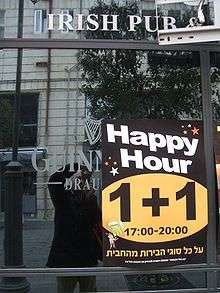Buy one, get one free
"Buy one, get one free" or "two for the price of one" is a common form of sales promotion. Economist Alex Tabarrok has argued that the success of this promotion lies in the fact that the price actually considers the fact that two items are being sold. The price of "one" is somewhat nominal and is typically raised when used as part of a buy one get one free deal. Whilst the cost per item is proportionately cheaper than if bought on its own, it is not actually half price.[1]

This technique is commonly known in the marketing industry by the acronym BOGOF.[2]
Criticism and negative publicity in the UK
Two-for-one promotions were criticised in the United Kingdom in 2014, at a time of concern over food waste. Because many foods under such offers have short shelf lives, customers are more likely to pass the products' use by date.[3][4][5]
Supermarkets have also been blamed for contributing to the increase in obesity through buy one, get one free promotions.[6] In 2012, the University of East Anglia's Norwich Business School conducted research into products used in buy one, get one free deals. The results showed that these promotions are aimed towards unhealthy products, such as chocolate, sweets and soft drinks.[7] In 2014, the Department of Health encouraged the industry to develop "responsible" deals, and considered banning two-for-one offers.[8]
Other promotional offers
Retailers use many promotional offers to increase sales, attract new customers, and keep old customers. Also, some countries have laws requiring products to be sold at full price for a specific period of time before they can be put on offer. Promotional offers are crucial in the retail industry; their many benefits play a large part in increasing sales, profit, and revenue. These promotional offers fall under different categories, and a few are listed below:[9][10]
Quantity and other common promotions
- Buy one, get one half price
- One for One. An incorrect term only used in Singapore. A poor translation of "buy one, get one free"
- Buy one product from category A and get another product from category B free
- Buy two, get one half price
- Buy three for the price of two
- Buy three items for a certain fixed price
- Buy six, get the seventh free - used to sell scientific books in the eighteenth century by William Mears[11]
- Free testers of new release products
- Promotions on certain weekdays
- Seasonal based sales
- Discounts targeted at groups of people such as: Students, OAPs, NHS employees, Armed Forces employees, females only
Price Discount
- Save X amount when you spend Y amount or more (Voucher)
- X amount off selected items
- X% off selected items
- X% off selected items (Voucher)
- Buy item X and get % discount on item Y
Delivery Promotions
- Free delivery for all orders over X amount
- Free delivery for any item
- Save X amount on your delivery
- Delivery charge for one product and the rest free
References
- Buy one get one free, from Marginal Revolution. Retrieved 2008-01-05.
- Wallop, Harry (2008-07-07). "Food waste: Why supermarkets will never say bogof to buy one get one free". London: Telegraph. Retrieved 2010-08-28.
- Young, Philippa (6 April 2014). "Supermarket 'Bogof' deals criticised over food waste". BBC News. Retrieved 17 October 2014.
- "Buy-one-get-one-free offers 'should be scrapped to cut food waste'". 6 April 2014. Retrieved 17 October 2014.
- Swinburne, Zander (6 April 2014). "Supermarkets urged to scrap buy-one-get-one-free as shoppers waste 222m tons of food a year". The Independent. London. Retrieved 20 October 2014.
- Stones, Mike. "'Promotions fuel obesity and waste". foodmanufacture.co.uk. Retrieved 19 October 2014.
- "Supermarket offers: a healthy choice for consumers?". uea.ac.uk. Retrieved 20 October 2014.
- Evans, Tara. "The end of buy one get one free? Government considers plans to scrap multibuy deals to tackle obesity". thisismoney.co.uk. Retrieved 22 October 2014.
- Friesner, Tim. "Pricing Strategies". marketingteacher.com. Retrieved 23 October 2014.
- "Retail:Discounts and Promotions Rules". wiki.openbravo.com. Retrieved 23 October 2014.
- Wigelsworth, Jeffrey R. (2016). Selling Science in the Age of Newton: Advertising and the Commoditization of Knowledge. Routledge. ISBN 9781317057338. Retrieved 11 October 2018.
External links
| Look up BOGO or BOGOF in Wiktionary, the free dictionary. |
- Cambridge Online Dictionary, Cambridge Advanced Learner's Dictionary